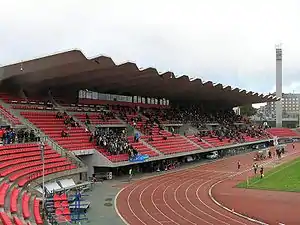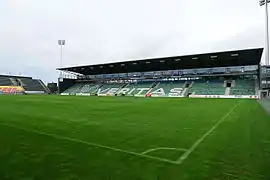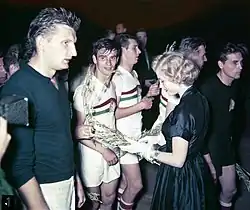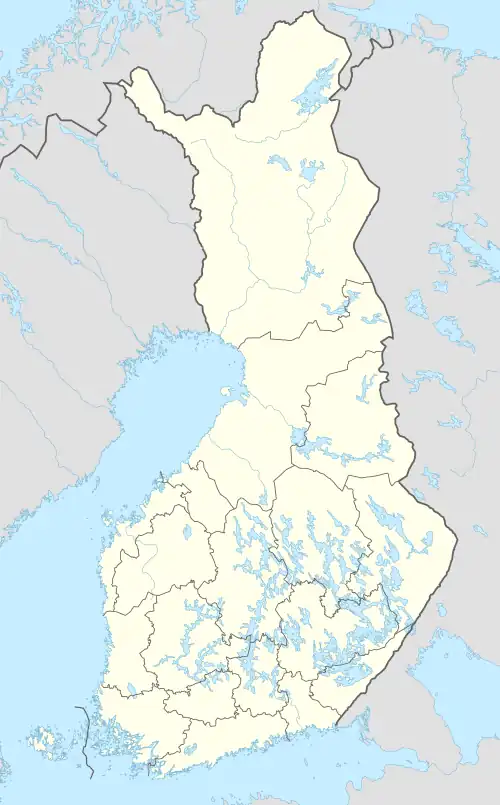 | |
| Tournament details | |
|---|---|
| Host country | Finland |
| Dates | 15 July – 2 August 1952 |
| Teams | 25 (from 5 confederations) |
| Venue(s) | 6 (in 5 host cities) |
| Final positions | |
| Champions | |
| Runners-up | |
| Third place | |
| Fourth place | |
| Tournament statistics | |
| Matches played | 26 |
| Goals scored | 135 (5.19 per match) |
The Football tournament at the 1952 Summer Olympics was won by Hungary.[1]
The games signalled the arrival (to Western Europeans at least) of the Hungary national team – the "Magical Magyars". Ferenc Puskás later said of the 1952 competition: "It was during the Olympics that our football first started to flow with real power."[2] It was during the Games that Stanley Rous of English Football Association invited the Hungarians to play a friendly at Wembley the following year.
Venues
| Helsinki | Kotka | ||
|---|---|---|---|
| Olympic Stadium | Kotkan urheilukeskus | ||
| Capacity: 70,470 | Capacity: 11,400 | ||
 |
 | ||
| Helsinki | Lahti | ||
| Töölön Pallokenttä | Lahden kisapuisto | ||
| Capacity: 18,050 | Capacity: 8,067 | ||
 |
 | ||
| Tampere | Turku | ||
| Ratina Stadion | Kupittaan jalkapallostadion | ||
| Capacity: 20,700 | Capacity: 14,224 | ||
 |
 | ||
Squads
Final tournament

Preliminary round
The preliminary round saw Hungary record a narrow victory against Romania, whilst there was an 8–0 victory for Italy against the United States, and a 5–1 victory for Brazil against The Netherlands. Great Britain succumbed to Luxembourg 5–3, whilst Egypt defeated Chile 5–4. Yugoslavia were drawn against the Indians and won 10–1.
| Yugoslavia | 10–1 | |
|---|---|---|
| Vukas Mitić Zebec Ognjanov |
Report | Khan |
| Denmark | 2–1 | |
|---|---|---|
| P.E. Petersen |
Report | Emmanouilidis |
| Italy | 8–0 | |
|---|---|---|
| Gimona Pandolfini Venturi Fontanesi Mariani |
Report |
| Brazil | 5–1 | |
|---|---|---|
| Humberto Larry Jansen Vavá |
Report | Van Roessel |
| Luxembourg | 5–3 (a.e.t.) | |
|---|---|---|
| Roller Letsch Gales |
Report | Robb Slater Lewis |
First round
The first round saw Scandinavian countries join the competition; the hosts Finland were beaten 3–4 by Austria, whilst Sweden defeated neighbours Norway 4–1. The game of the round was between Yugoslavia and the Soviet Union; Yugoslavia had been 5–1 ahead with 30 minutes of the match to go, only for the Soviet captain Bobrov to score a hat-trick and inspire his team to an eventual 5–5 draw. A replay resulted in a 3–1 victory for Yugoslavia; the Soviet side had been expected by Moscow to win the 1952 Games, and their defeat by Yugoslavia was not mentioned in the Soviet press until after Stalin's death the following year.
| Finland | 3–4 | |
|---|---|---|
| Stolpe Rytkönen |
Report | Gollnhuber Stumpf Grohs |
| Yugoslavia | 5–5 (a.e.t.) | |
|---|---|---|
| Mitić Ognjanov Zebec Bobek |
Report | Bobrov Trofimov Petrov |
| Yugoslavia | 3–1 | |
|---|---|---|
| Mitić Bobek Čajkovski |
Report | Bobrov |
| Denmark | 2–0 | |
|---|---|---|
| Seebach S. Nielsen |
Report |
Quarterfinals
Sweden defeated Austria to ensure a Scandinavian presence in the semifinals. Germany surprisingly beat Brazil 4–2 after extra time, whilst Yugoslavia won comfortably in a 5–3 defeat of Denmark. Hungary demolished Turkey 7–1 to complete the four semifinalists.
| West Germany | 4–2 (a.e.t.) | |
|---|---|---|
| Schröder Klug Zeitler |
Report | Larry Zózimo |
| Hungary | 7–1 | |
|---|---|---|
| Palotás Kocsis Lantos Puskás Bozsik |
Report | Guder |
Semifinals
In the first semifinal, Hungary saw off Sweden with a comprehensive 6–0 victory, whilst Yugoslavia beat Germany 3–1 to set up a Hungary-Yugoslavia final.
| Yugoslavia | 3–1 | |
|---|---|---|
| Mitić Čajkovski |
Report | Stollenwerk |
Bronze-medal match
There was some consolation for the Scandinavian countries as Sweden defeated Germany 2–0 in the third place play-off to secure the bronze medal.
| Sweden | 2–0 | |
|---|---|---|
| Rydell Löfgren |
Report |
Gold-medal match
Two goals from Puskás and Zoltán Czibor saw Hungary beat Yugoslavia and take the gold medal.[3]
| Hungary | 2–0 | |
|---|---|---|
| Puskás Czibor |
Report |
| Team details | ||||||||||||||||||||||||||||||||||||||||||||||
|---|---|---|---|---|---|---|---|---|---|---|---|---|---|---|---|---|---|---|---|---|---|---|---|---|---|---|---|---|---|---|---|---|---|---|---|---|---|---|---|---|---|---|---|---|---|---|
| ||||||||||||||||||||||||||||||||||||||||||||||
Bracket
| First Round | Quarterfinals | Semifinals | Finals | ||||||||||||||||
| 3 | |||||||||||||||||||
| 0 | |||||||||||||||||||
| 7 | |||||||||||||||||||
| 1 | |||||||||||||||||||
| 2 | |||||||||||||||||||
| 1 | |||||||||||||||||||
| 6 | |||||||||||||||||||
| 0 | |||||||||||||||||||
| 4 | |||||||||||||||||||
| 1 | |||||||||||||||||||
| 3 | |||||||||||||||||||
| 1 | |||||||||||||||||||
| 3 | |||||||||||||||||||
| 4 | |||||||||||||||||||
| 2 | |||||||||||||||||||
| 0 | |||||||||||||||||||
| 2 | |||||||||||||||||||
| 0 | |||||||||||||||||||
| 3 | |||||||||||||||||||
| 5 | |||||||||||||||||||
| 5 (3) | |||||||||||||||||||
| 5 (1) | |||||||||||||||||||
| 3 | |||||||||||||||||||
| 1 | |||||||||||||||||||
| 1 | |||||||||||||||||||
| 2 | |||||||||||||||||||
| 2 | |||||||||||||||||||
| 4 | |||||||||||||||||||
| 3 | |||||||||||||||||||
| 1 | |||||||||||||||||||
Medalists
Goalscorers
- 7 goals
.svg.png.webp) Branko Zebec (Yugoslavia)
Branko Zebec (Yugoslavia)
- 6 goals
.svg.png.webp) Sándor Kocsis (Hungary)
Sándor Kocsis (Hungary).svg.png.webp) Rajko Mitić (Yugoslavia)
Rajko Mitić (Yugoslavia)
- 5 goals
.svg.png.webp) Vsevolod Bobrov (Soviet Union)
Vsevolod Bobrov (Soviet Union)
- 4 goals
.svg.png.webp) Larry (Brazil)
Larry (Brazil).svg.png.webp) El-Sayed El-Dhizui (Egypt)
El-Sayed El-Dhizui (Egypt) Willi Schröder (Germany)
Willi Schröder (Germany).svg.png.webp) Péter Palotás (Hungary)
Péter Palotás (Hungary).svg.png.webp) Ferenc Puskás (Hungary)
Ferenc Puskás (Hungary).svg.png.webp) Tihomir Ognjanov (Yugoslavia)
Tihomir Ognjanov (Yugoslavia)
- 3 goals
 Aredio Gimona (Italy)
Aredio Gimona (Italy) Joseph Roller (Luxembourg)
Joseph Roller (Luxembourg) Yngve Brodd (Sweden)
Yngve Brodd (Sweden) Ingvar Rydell (Sweden)
Ingvar Rydell (Sweden).svg.png.webp) Stjepan Bobek (Yugoslavia)
Stjepan Bobek (Yugoslavia).svg.png.webp) Zlatko Čajkovski (Yugoslavia)
Zlatko Čajkovski (Yugoslavia).svg.png.webp) Bernard Vukas (Yugoslavia)
Bernard Vukas (Yugoslavia)
- 2 goals
 Otto Gollnhuber (Austria)
Otto Gollnhuber (Austria) Herbert Grohs (Austria)
Herbert Grohs (Austria).svg.png.webp) Humberto Tozzi (Brazil)
Humberto Tozzi (Brazil) Irenio Jara (Chile)
Irenio Jara (Chile) Julio Vial (Chile)
Julio Vial (Chile) Poul Erik Petersen (Denmark)
Poul Erik Petersen (Denmark) Holger Seebach (Denmark)
Holger Seebach (Denmark) Olof Stolpe (Finland)
Olof Stolpe (Finland) Karl Klug (Germany)
Karl Klug (Germany).svg.png.webp) Zoltán Czibor (Hungary)
Zoltán Czibor (Hungary) Egisto Pandolfini (Italy)
Egisto Pandolfini (Italy) Julien Gales (Luxembourg)
Julien Gales (Luxembourg).svg.png.webp) Vasili Trofimov (Soviet Union)
Vasili Trofimov (Soviet Union)
- 1 goal
 Erich Stumpf (Austria)
Erich Stumpf (Austria).svg.png.webp) Jansen (Brazil)
Jansen (Brazil).svg.png.webp) Vavá (Brazil)
Vavá (Brazil).svg.png.webp) Zózimo (Brazil)
Zózimo (Brazil).svg.png.webp) Ivan Petkov Kolev (Bulgaria)
Ivan Petkov Kolev (Bulgaria) Jens Peter Hansen (Denmark)
Jens Peter Hansen (Denmark) Knud Lundberg (Denmark)
Knud Lundberg (Denmark) Svend Nielsen (Denmark)
Svend Nielsen (Denmark).svg.png.webp) Khamal Ahmed Elfar (Egypt)
Khamal Ahmed Elfar (Egypt).svg.png.webp) Mechaury (Egypt)
Mechaury (Egypt) Aulis Rytkönen (Finland)
Aulis Rytkönen (Finland).svg.png.webp) Michel Leblond (France)
Michel Leblond (France) Georg Stollenwerk (Germany)
Georg Stollenwerk (Germany) Johann Zeitler (Germany)
Johann Zeitler (Germany) Jim Lewis (Great Britain)
Jim Lewis (Great Britain) George Robb (Great Britain)
George Robb (Great Britain) Bill Slater (Great Britain)
Bill Slater (Great Britain).svg.png.webp) Pavlos Emmanouilidis (Greece)
Pavlos Emmanouilidis (Greece).svg.png.webp) József Bozsik (Hungary)
József Bozsik (Hungary).svg.png.webp) Nándor Hidegkuti (Hungary)
Nándor Hidegkuti (Hungary).svg.png.webp) Mihály Lantos (Hungary)
Mihály Lantos (Hungary) Ahmed Mohammed Khan (India)
Ahmed Mohammed Khan (India) Alberto Fontanesi (Italy)
Alberto Fontanesi (Italy) Amos Mariani (Italy)
Amos Mariani (Italy) Arcadio Venturi (Italy)
Arcadio Venturi (Italy) Léon Letsch (Luxembourg)
Léon Letsch (Luxembourg) Joannes van Roesell (Netherlands)
Joannes van Roesell (Netherlands).svg.png.webp) Jan Briezen (Netherlands Antilles)
Jan Briezen (Netherlands Antilles) Odd Wang Sørensen (Norway)
Odd Wang Sørensen (Norway).svg.png.webp) Jerzy Krasówka (Poland)
Jerzy Krasówka (Poland).svg.png.webp) Kazimierz Trampisz (Poland)
Kazimierz Trampisz (Poland).svg.png.webp) Ion Suru (Romania)
Ion Suru (Romania).svg.png.webp) Aleksandr Petrov (Soviet Union)
Aleksandr Petrov (Soviet Union) Sylve Bengtsson (Sweden)
Sylve Bengtsson (Sweden) Gösta Löfgren (Sweden)
Gösta Löfgren (Sweden) Gösta Sandberg (Sweden)
Gösta Sandberg (Sweden) Tekin Bilge (Turkey)
Tekin Bilge (Turkey) Ercument Guder (Turkey)
Ercument Guder (Turkey) Muzaffer Tokaç (Turkey)
Muzaffer Tokaç (Turkey)
- Own goal
 Gösta Lindh (Sweden, against Hungary)
Gösta Lindh (Sweden, against Hungary)
Soviet Union vs Yugoslavia
The first meeting between the Soviet Union and Yugoslavia is still the most famous one. On the political level, the Soviet leader Joseph Stalin and the Yugoslav leader Josip Broz Tito split in 1948, which resulted in Yugoslavia being excluded from the Communist Information Bureau. The origin of the conflict was Tito's refusal to submit to Stalin's interpretations and visions of politics and in process becoming a Soviet satellite state. Before the match, both Tito and Stalin sent telegrams to their national teams, which showed just how important it was for the two head of states. Yugoslavia led 5–1, but a Soviet comeback in the last 15 minutes resulted in a 5–5 draw. The match was replayed, Yugoslavia winning 3–1. The defeat to the archrivals hit Soviet football hard, and after just three games played in the season, CDKA Moscow, who had made up most of the USSR squad, was forced to withdraw from the league and later disbanded. Furthermore, Boris Arkadiev, who coached both USSR and CDKA, was stripped of his Merited Master of Sports of the USSR title.[4]
References
- ↑ "Football at the 1952 Helsinki Summer Games". Sports Reference. Archived from the original on 17 April 2020. Retrieved 12 October 2018.
- ↑ "Puskas on life and football". The Guardian. 19 November 2006. Retrieved 31 January 2013.
- ↑ Football at the 1952 Helsinki Summer Games Archived 14 March 2016 at the Wayback Machine. sports-reference.com
- ↑ "USSR – Yugoslavia, the Story of Two Different Football Conceptions". russianfootballnews.com. Retrieved 27 November 2017.

